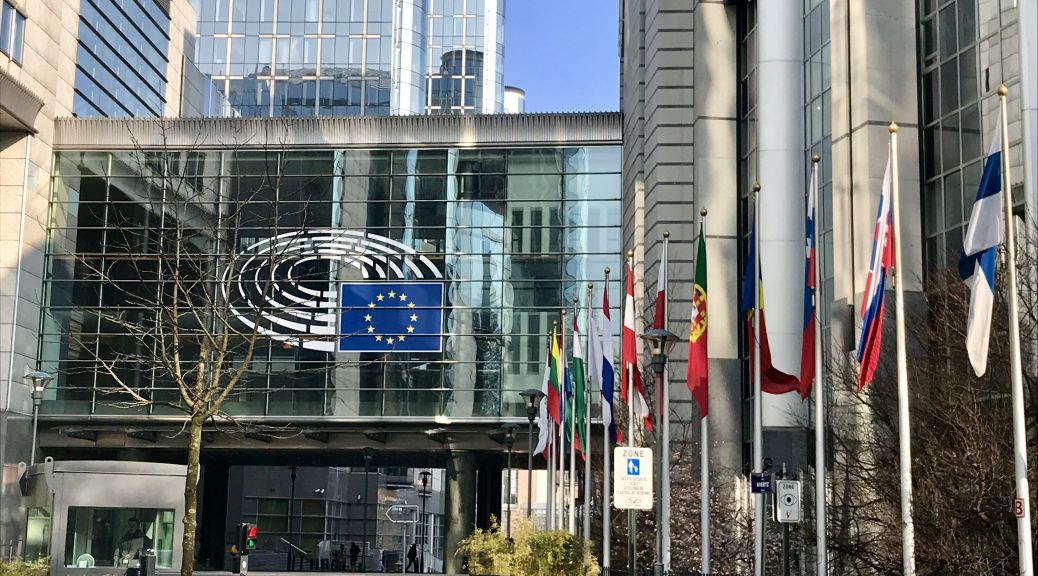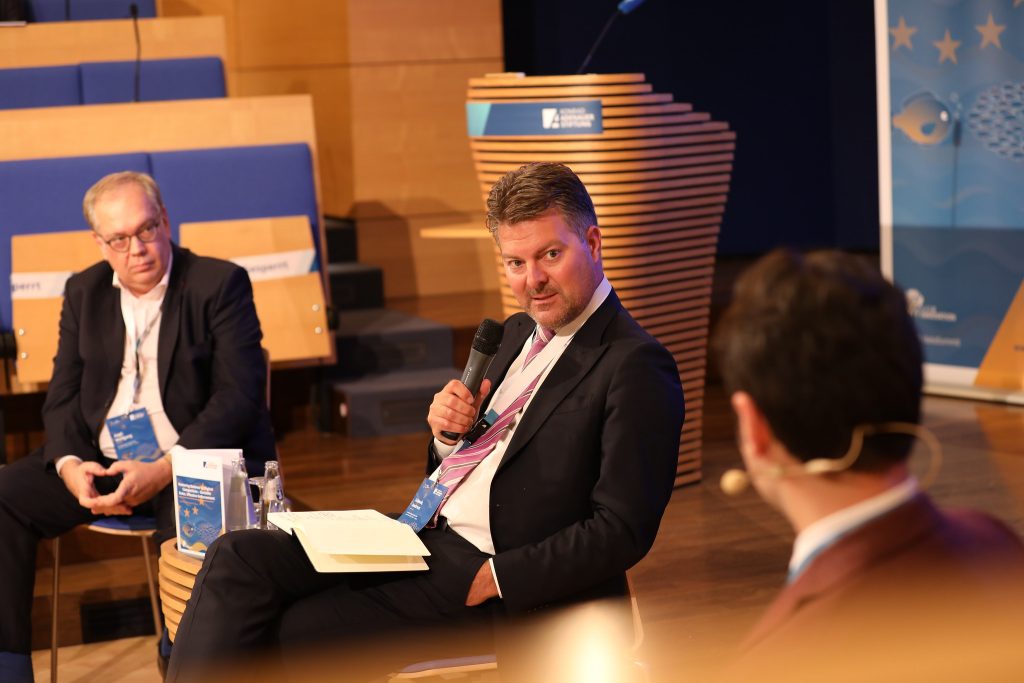
The DMA after the Schwab-Report
This week we received the Draft Report from the European Parliament by Andreas Schwab, who as a rapporteur is entrusted with preparing the decision-making of the lead Committee on the Internal Market and Consumer Protection on the DMA. As a reminder, although the Commission has the right of initiative, the Parliament and the Council are ultimately responsible for legislation. Depending on whom you ask, Schwab’s proposed amendments can be described as making the DMA tougher – or more relaxed.

Andreas Schwab with Wolfgang Kopf (Deutsche Telekom) and Pencho Kuzev (Konrad Adenauer Stiftung) at the European Data Summit 2020 in Berlin. Photo by Juliane Liebers/Konrad-Adenauer-Stiftung.
DMA (quasi) only for GAFAs?
For companies that are gatekeepers in the sense of the DMA, Schwab proposes to have tougher obligations. In return, however, the requirements for classification as a gatekeeper were increased, so that fewer companies fall under the regulation. For example, instead of an annual turnover of 6.5 billion euros in the EEA, one of 10 billion euros is now required. In addition, the market capitalisation threshold has been raised from 65 to 100 billion euros. Even more far-reaching is the newly created requirement that companies must operate at least two “core platform services” with 45 million active monthly users each in order to be considered gatekeepers. So anyone who only operates one platform is not supposed to be a gatekeeper. This means that companies like Booking.com or Zalando should breathe a sigh of relief for the time being. The DMA is likely to remain applicable to the four GAFAs and Microsoft.
The DMA should be clearly targeted to those platforms that play an unquestionable role as gatekeepers due to their size and their impact on the internal market. To this end, it is appropriate to increase the quantitative thresholds and to add – as an additional condition (…) that they are providers of not only one but, at least, two core platform services. The provision of two or more core platform services is also an important indicator of the role of these companies as providers of an ecosystem of services.
Those who are gatekeepers must – if the Schwab plans become an act a regulation – act more quickly and notify the Commission within one month (previously three months) from the time the thresholds are exceeded. In addition, the DMA is to be applicable not only 6 months after entry into force, but already after 2 months. Gatekeepers must now fulfil their obligations within 4 months (previously 6 months).

Tougher obligations
The German rapporteur would like to see the already intense obligations in Art. 5 and 6 of the draft DMA further sharpened. According to Art. 5 (a) of the DMA draft, gatekeepers should be prohibited from combining personal data from different sources unless the user has given consent in accordance with Art. 6(1) (a) of the GDPR (see also the recently published paper by Rupprecht Podszun on this). Effective consent generally requires that the user has genuine choice. Recital 36 of the draft DMA is intended to clarify that this is only the case if the alternative offered is less personalised, but nevertheless “equivalent”. According to this, it should probably not be sufficient if a social network only offers a functionally highly limited alternative if the user does not consent to the combination of her data. Furthermore, it should be added to Art. 5 (a) DMA draft that gatekeepers may also not alternatively rely on Art. 6 (1) (b) GDPR (performance of contract) and Art. 6(1) (f) GDPR (legitimate interest).
According to an addition to Art. 6(1) (d) DMA draft, the following applies: If search engines display further products or services in addition to the organic search results (here, of course, Google Shopping comes to mind), they must offer competitors equal opportunities to be displayed in this place (against payment). The search engine must treat its own complementary service as an independent business and this must be economically profitable even without being part of the gatekeeper. At first glance, this almost seems like a kind of unbundling.
The obligation for app store operators to grant third parties access to their store on FRAND terms, as provided for in Art. 6(1)(k) of the draft DMA, was extended to all core platform services. A general prohibition of self-preferential treatment for all core platform services was also included in a half-sentence. However, as always in cases where self-preference is to be prevented, it is not clear what the equal treatment should look like. Can the search engine auction off the display space, award it to its own service and move the money from one corporate account to the other? At least for the search engine cases, however, the new requirement that the other service must be independently profitable could remedy this.
Under Schwab’s plans, gatekeepers are to bear the burden of proof for compliance with the obligations under the DMA in a specific manner:
Art. 7 (1) DMA draft
“It shall be the responsibility of the gatekeeper to ensure and demonstrate compliance with the obligations laid down in Articles 5 and 6 by design” (bold added here).
What is meant by this is not explained in more detail, but the wording opens up space for technical solutions that are likely to be more effective than solutions in terms & conditions.
Enforcement
The tiered relationship between behavioural and structural remedies has been removed in the remedies for systematic violations of the obligations under the DMA. Structural remedies are no longer subsidiary to behavioural remedies. This makes the unbundling of gatekeepers somewhat easier, at least on paper.
Although Schwab says he wants to acknowledge the Commission’s limited resources, he has decided to remove the possibility of commitments from the DMA altogether. These, he writes, are neither necessary nor appropriate given the nature of the DMA as ex-ante and self-executing. This forces the Commission to either issue a formal termination order in case of violations or to negotiate with the gatekeepers on a purely informal basis. Commitments could have been a happy middle ground solution.
Schwab, who was a guest on the latest episode of the (German language) Haucap/Podszun podcast “Bei Anruf Wettbewerb” (When Competition Calls), expressed even more concrete plans in the interview, which should certainly please the Commission. He envisages a separate directorate-general within the Commission, which would be exclusively entrusted with the enforcement of the DMA. This would also make the demarcation from traditional antitrust law even clearer. Schwab also has big – perhaps not entirely serious – plans for the staffing. If you put the Commission’s tasks in relation to those of the French or German antitrust authorities, you would have to come up with about 1000 people in staff, so he said (with a wink of the eye)…
Market investigations?
After the Schwab draft, the prerequisites of the Commission’s possibility to update the DMA are unclear. In its draft, the Commission had recognised that the market behaviour of gatekeepers can always change and thus new but comparably harmful behaviour can occur, which the DMA does not prohibit. For this reason, the Commission is to be empowered in Art. 10 of the draft DMA to adopt delegated acts establishing new obligations for gatekeepers. Before doing so, however, it had to have carried out a market investigation in accordance with Art. 17 of the draft DMA. After publication of the Commission’s draft, it was criticised – among others by our DMA team Podszun/Bongartz/Langenstein – that such market investigations would take too long. This may be the reason why, according to Schwab’s proposals, Art. 17 DMA draft, which regulates the content of market investigations, no longer mentions conducting investigations for this purpose. However, Art. 10 still requires a market investigation and refers to Art. 17 for this purpose. Unless one wants to assume that Schwab merely forgot to delete the reference in Art. 10 of the draft DMA, a market investigation is still required. The whole thing is not entirely clear, however, as the requirement for a market investigation was also deleted in one place in the recitals, but remains in another place.

Role of the national competition authorities
After the Commission’s draft, the role of the national competition authorities (NCAs) under the DMA was disputed. Should they also be involved in its enforcement or should only the Commission be responsible for it? As things stand, the role of the NCAs is limited to assisting in investigations (ultimately probably like in dawn raids) and participation in a new body envisaged in the Schwab draft. The “European High-Level Group of Digital Regulators” is to be composed of representatives of the Commission, the national competition authorities and other relevant authorities. However, its powers are essentially limited to advising the Commission. Whether this amounts to more than just the somewhat ineffective Advisory Committee remains to be seen for the time being. Speaking of influences: At the end of the 85 pages, the rapporteur lists with whom he has spoken in advance. The list ranges from gatekeepers to the German undertaking Bundesdruckerei to individual, well-known professors. Transparency that one would also like to see in other legislative procedures (at least in Germany).
Remaining uncertainties
Finally, a look at the relationship of the DMA to national law is necessary. This has already been one of the most exciting topics surrounding the DMA after the Commission’s draft (at least from the perspective of German lawyers who cherish the new section 19a of the German competition act). It was discussed whether the efforts of the German legislator to “tame the tech giants” with Section 19a (you can find an official English translation of the new act here) would be rendered obsolete by the DMA. The keyword here is harmonisation of the applicable law.
For the purposes of harmonisation, the Commission draft (and also the Schwab version) distinguishes between provisions intended to ensure the fairness and contestability of markets (Art. 1(5) DMA draft) and original competition law provisions (Art. 1(6) DMA draft). Since the DMA does not provide for a case-by-case assessment of the harmfulness of the prohibited conduct to competition and no efficiency defences are possible on the part of the gatekeepers, the Commission assumes (cf. recitals 8-10 of the draft DMA) that the DMA is not competition law but contains “contestability rules”. National law of this kind is to be blocked in future according to Art. 1(5) of the draft DMA, while national competition law is to continue to be permissible according to Art. 1(6) of the draft DMA. However, in the case of provisions such as Section 19a of the German GWB, it is not clear whether it is a matter of “contestability law” or competition law. According to the (not undisputed) conception of the German legislator, Section 19a is a more concrete spelling out of abuse provisions in competition law and thus a case for Art. 1(6) DMA. However, it obviously has a similar goal as the DMA, in any case does not presuppose the same effects analysis as in traditional antitrust and is likely to affect essentially the same companies.
Here, however, a problem arises with regard to the legislative competence of the EU, which has already been raised by other voices. Article 114 TFEU, on which the Commission relies for the DMA, presupposes, among other things, that a (threatened) fragmentation of law within the EU is eliminated. Whether this is the case thus ultimately depends on whether Section 19a GWB and comparable provisions, possibly not even enacted yet, are covered by the harmonising effect of Article 1(5) of the draft DMA. If this is not the case, the requirements of Art. 114 TFEU may be difficult to meet – and the DMA could be in danger of being overturned in court.
The Schwab draft has not been able to eliminate these uncertainties. Only the applicability of national antitrust law in addition to the DMA was once again formulated more clearly. Schwab acknowledges the tension in the podcast “Bei Anruf Wettbewerb”. When asked about the question of competence, however, he remains committed to the harmonisation of legal provisions in the Union:
“The Regulation has the object of full harmonisation”. (freely translated)
Outlook
The report does not bring a breakthrough in merger control (now the national authorities are to be informed as well) – how could it, there is no legal basis for it. But questions also remain for two other key issues of the draft DMA: The first question is that of enforcement. How will the DMA be enforced by the Commission – does it work? And does it work without the involvement of national authorities? In the podcast, Andreas Schwab indicated that he envisages some kind of negotiation with the Commission also for the Art. 5 obligations of the gatekeepers, even if they are automatic obligations. The second central question: How will the DMA be updated? Schwab has now refrained from introducing a general clause, which he had flirted with for a long time. For the time being, updates via delegated acts will remain, along with all the weaknesses they have. The architecture of the DMA as a whole has thus not been touched – this also applies to the central norms in Art. 5 and 6 DMA draft, where there have, however, been some shifts (with a tendency towards sharpness).
It remains to be seen what the Parliament and the Council think about the Commission’s draft and what they make out of it. In the upcoming trilogue procedure, there is probably still negotiating material in stock. The greatest uncertainty for legislators is likely to remain the question of legislative competence. Here, greater harmonisation would be possible in order to avoid the danger of the regulation being declared null and void. In return, the national competition authorities could be more heavily involved in the enforcement of the DMA.
Philipp Offergeld is a research assistant at the Chair of Civil Law, German and European Competition Law at Heinrich Heine University Düsseldorf and a doctoral student with Prof. Podszun.

One thought on “The DMA after the Schwab-Report”